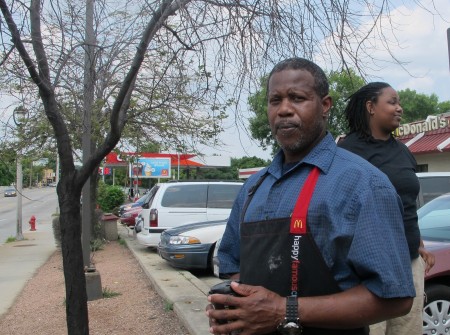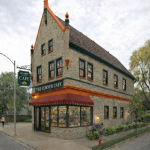McDonald’s Workers Applaud Federal Ruling
NLRB says McDonald's controls franchises, opening door to workers pushing for higher wages.
Several dozen people gathered recently at McDonald’s on 35th Street and Juneau Avenue to support higher wages and the right to unionize at franchised restaurants such as McDonald’s. Some drivers passing by honked their horns in agreement.
“At the heart of this movement is fair treatment, and McDonald’s needs to finally admit they have the power to pay its workers fairly,” said Jennifer Epps-Addison, executive director of Wisconsin Jobs Now, addressing the participants.
On July 29, the National Labor Relations Board general counsel issued an opinion that McDonald’s Corp. has control over franchise operations and can decide how much workers are paid and whether they can form unions. McDonald’s and other fast-food chains have claimed they cannot control wages at their franchised restaurants.

McDonald’s maintenance worker Tommie Griffin protests low wages at a rally outside of McDonald’s on 35th and Juneau. (Photo By Raina J. Johnson)
However, the recent NLRB counsel’s decision stated that the company and its franchisees are joint employers.
Workers allege that they have been threatened with termination for protesting low wages. The NLRB ruled that the company could be held liable for such labor violations by its franchisees. Since 2012, 181 cases have been filed against McDonald’s with the National Labor Relations Board, according to the board. Of those, 43 were found to have merit.
“There’s no two ways about it: The Golden Arches is an employer, plain and simple,” said Micah Wissinger, an attorney who brought the case on behalf of McDonald’s workers in New York City, in a press release. “The reality is that McDonald’s requires franchisees to adhere to such regimented rules and regulations that there’s no doubt who’s really in charge.”
Low-wage workers in Milwaukee and throughout the country have been demanding a $15 per hour minimum wage and the right to form unions without retaliation.
McDonald’s has long held that it does not make employment decisions for its franchisees. Heather Smedstad, senior vice president for McDonald’s, told the New York Times, that this decision “changes the rules for thousands of small businesses, and goes against decades of established law.” About 90 percent of McDonald’s chain restaurants in the United States are franchised.
Tommie Griffin, 50, a maintenance worker since 2009 at the McDonald’s restaurant on 35th and Juneau, said he was forced to work there because of the downturn in the economy, and now feels stuck.
“This McDonald’s is in my neighborhood, it’s convenient for me. I went to school and now I’m stuck here with student debt,” said Griffin who works 20 to 30 hours a week but says he doesn’t earn enough to support himself.
“We should be able to pay basic utilities,” he said. “We’re fighting for higher wages because we’re seeking a better quality of life, a sense of independence.”
This story was originally published by Milwaukee Neighborhood News Service, where you can find other stories reporting on fifteen city neighborhoods in Milwaukee.























This is the first step in a very long protracted process that has the potential to upend the entire franchise system. The level of change this could engender in many industries that utilize the franchise system and the larger economy is astounding. I don’t understand though how the NLRB can reverse such a long history and precedent that stated the franchiser is not the employer.